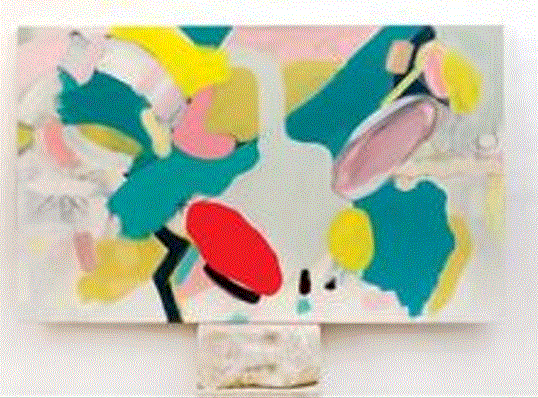Another Glance
What did HBO’s “Looking: The Movie” accomplish?

The two-hour series finale of “Looking” began with a panorama of an American metropolis after HBO’s trademark static. We saw Patrick, the protagonist played by Jonathan Groff, who’s flown into San Francisco after nine months in Colorado. Catching a ride to his first stop (a Chinese diner, naturally; a character in Season Two noted that Patrick’s “always hungry”), he’s asked by the driver whether he’s visited before (yes), then why he’s back. Patrick tells him it’s for a wedding, and the driver asks whether that’s a good reason. Patrick answers honestly: ask him again on his way out.
This ambivalence is a fair nod to the series’ fans, plenty of whom wondered whether the two-hour special needed to happen at all. “Looking,” conceived by Michael Lannan on the heels of Andrew Haigh’s Weekend, ran for two seasons, from 2014 to the middle of 2015. Most of the series’ best episodes felt a lot like Haigh’s film — a documentary-esque burner about two dudes who hook up and learn more about each other in two days than everyone else does in decades — but viewers unfamiliar with it immediately dubbed “Looking” a gay “Girls.” Or a gay “Sex and the City.” On the word of its staff and subject matter alone, and before it received its first reviews, the show was deemed a gay, consistently-well-shot-but-probably-contrived-narrative-of-thirty-somethings-in-a-major-American-city.
For better or worse, that preemptive assessment wasn’t too far off: the series followed Patrick and his friends, Dom and Agustin, as they negotiated a highly concentrated layer of gay life in the Bay area. They fell in and out of relationships. They danced at bars. They took drugs. They fell into relationships they had no business falling into, and found fresh and unique ways to destroy others that had everything going for them. Patrick’s biggest issue throughout the series was less with his sexuality than coming into his own as a person in the world, as someone who could take risks and invest in others.
Dom, acting as one half of Patrick’s conscience, shifted between a commitment to his profession and the demands of his relationships; while Agustin, serving as the other half, rose from addiction and spontaneity to become one of the show’s most grounded characters (his wedding is the one that Patrick’s flying back to town for). There’s Kevin, who wanted an open relationship, and Doris, Dom’s oldest-straight-friend, and Richie — arguably the series’ biggest missed opportunity as far as character development was concerned, as the character most amenable to investigating gayness’ relationship with race and class — who served as the love interest Patrick orbited for eighteen episodes.

Sometimes, “Looking” was just fine. Other times, it was brilliant. But mostly the series felt like a high-wire act between its actors and producers. The question wasn’t whether or not they could pull it off (they could), but whether it was sustainable, and then whether audiences were willing to deal with the inconsistency. A frequent critique of the series was that its characters were boring. No one did anything. The gays weren’t prancing and screaming and YAS-ing. The arcs that did exist were fluid, and characters disappeared for episodes at a time, and its protagonist was whiny and privileged and increasingly hard to empathize with — when Patrick himself in a fucked up situation, his audience seldom had reason to root for him. All too often, it was just too easy to side against him.
But at its best, the series was less of an explanation for gay life than an illustration of how banal it could sometimes be. “Looking”’s gayness wasn’t leading to any illumination in particular. It had no goal, no pent-up resolution. Dom and Agustin weren’t being gay, they just were (and, as Wesley Morris observed at Grantland, “Haigh and “Looking”’s creator, Michael Lannan, are both gay. The show they’ve made doesn’t pander to any audience. It is simply, though not solely, the product of an unprecedented social moment for gays and lesbians.”).
There are plenty of arguments about what makes art truly gay, or whether the show’s studied aloofness, with its insistence upon shrugging off any particular agenda, detracts from a queer aesthetic, or whether anyone was being let down, but the issue with “Looking” felt more like what the novelist Alan Hollinghurst said in the Paris Review about The Swimming Pool Library, a novel whose detractors had similar gripes — that Hollinghurst’s narrative didn’t have any particular message, that its characters were did little more than exist:
It was never designed to give a comprehensive or even particularly responsible picture of gay life. It was a book about the lives of some fairly peculiar people, which is what I’ve always been interested in examining. Nonetheless, part of its effect was that it revealed a world to a wider audience.
The shift in public opinion for the LGBTQ community over the last year paralleled the topics covered in the arc of the show. The Obergefell v. Hodges decision came down nearly four months after “Looking” was canceled, and by then, according to the Pew Research Center, only 39% of Americans opposed same-sex marriage (which included a rising favorability rising across all political spectrums, races, and religions). It’s one thing to watch Augustin gripe about gay complacency before marriage equality, and a whole subtle other to view those conversations afterwards. In the aftermath of the shootings at Pulse in Orlando, the series’ club scenes feel fleeting and foreboding.
So what did the show in? “Modern Family” and “Empire” and “The Real O’Neals” and any number of screening room-tested plot points have demonstrated that homosexuality, as an aggregate, isn’t the kill-switch it used to be (“The New Normal,” “One Big Happy,” “Smash,” and “Partners,” contrived as they may have been, weren’t cancelled because of their queerness, but because they were hot trash . What got “Looking,” in the end, was a certain type of gayness — the type that can carry your interest for thirty minutes, but doesn’t draw too-too much attention to itself. The type of gayness that is neither explicitly farcical, nor explicitly sexual, nor explicitly simple.
In 2012, Edmund White wrote in the New York Review of Books about the paradox of queer cultural transmission:
Since gay men rarely have gay parents, cultural transmission must come from friends or strangers (a problem since the generations so seldom mix in gay life). Another oddity is that the more one knows about gay culture (Broadway musicals, home decorating, the lingo), the less attractive one is to most gay men, who are generally looking for a bona fide macho man. Gay culture must be the only one that esteems precisely those who aren’t initiated. Imagine a devout Jew who rejected someone who knew the Torah.
Even if there aren’t enough, there are more ways to be openly gay in the United States than ever before. In the New York Times Magazine, Jenna Wortham wrote,“the speed with which modern society has adapted to accommodate the world’s vast spectrum of gender and sexual identities may be the most important cultural metamorphosis of our time.” “Looking” and Weekend and narratives that dare to simply be will have been crucial in getting us there.

It is one thing to watch “Looking” in the company of friends, or on the sofa with a lover, but re-watching the friendships develop on your own feels a lot like watching the crew behind cameras develop too. They’re getting just as comfortable with the actors’ silences, and learning to read the faces in front of the cameras. Mistakes made in the first season were amended in the second, and plot holes in its characters’ backgrounds were filled in. What sometimes felt like a lack of holistic diversity in the first season (they really couldn’t find one black gay in San Francisco?) was at least nodded to in the second (and particularly due to, I think, the script-work of Tanya Saracho; her episodes felt immediately, deeply, rounder, and lifting its characters from gentrified San Francisco gave the show some of its most honest moments).
By the second season’s penultimate episode, the banter was reliably in place. It was okay to introduce new characters, because the friend-group had been solidified. There was no need to set jokes up, because we knew the people telling them. The tragedy in “Looking”’s cancellation, maybe more so than what it could’ve been, is that the series evaporated right in the midst of its becoming.
The two-hour series finale premiered in June, on the closing night of San Francisco’s Frameline festival, but it aired on cable last Saturday. Nearly 284,000 people tuned in. Time called it a “moodily made made argument to check out a series that deserves a long afterlife.” But given a fan-base that was always small and often divided, some wondered whether the series even needed a wrap-up: its narrative arcs had reached their natural lulls. The second season’s final scene implicated that Patrick was ready to get his shit together — he told Richie he was ready to give their relationship a go. There was little reason to doubt him; it was a note as good as any to leave its viewer on forever.
But the real ending is the camera panning out immediately afterwards — this is one couple, in one city, at one point in time. It may or may not work out for Patrick and Richie. If the evidence is any indicator, it probably won’t. But it also very well may; and either way, life will go on; and this is as valid a parting message for the series as any they’ve delivered before.
Bryan Washington divides his time between Houston and New Orleans. He is working on a collection of short stories.
Here's Why Millennials Don't Have Sex
This one theory explains everything.

“A lot of them are afraid that they’ll get into something they can’t get out of and they won’t be able to get back to their desk and keep studying.”
Why aren’t millennials doing sex more? (For the purposes of this argument let’s pretend, like the Washington Post does, that millennials aren’t doing a lot of sex.) There are any number of reasons for millennial celibacy offered here: They’d rather be on the Internet, they are too driven with work/school, they’re afraid of being hurt, they don’t want to go through all the steps of consent culture, bodily fluids are icky, they don’t know how to relate to people in real life, and many of them are too unattractive to fuck or be fucked in our looks-based hookup society.
Here is my theory: They want to stay children.
I don’t mean to generalize but let’s be honest, this is a generation that has been coddled and protected and sheltered and adored for far longer than any other group in history. Say what you will about millennials — they’re trophy-hungry automatons whose valorization of their own self-esteem impedes their ability to develop interesting personalities and their comically earnest and perpetually irritating self-righteousness only serves to underline just how naive their understanding of the way power dynamics really work in societal structures is, plus you can never tear them away from the phones they keep close to themselves as if they were the only source of non-parental affection they’ve found in this world, which according to the Post is in fact the case — but they’re not stupid. They know that being a grown-up is mostly a miserable experience. They understand that when childhood ends and people start treating you the way real adults treat each other — transactionally at best, like shit most of the time — it’s rare that you are even acknowledged as a fellow human being, let alone a special star. The constant drip of approval they have grown up attached to gets yanked out hard, and no one even gives them a lollipop or a kiss on their boo-boo.
If all you’ve been given is applause and appreciation for your ability to complete the most basic tasks, the prospect of no longer being graded on a curve — of no longer being graded at all, in many cases, which may be the most horrible thing for these poor kids — must be terrifying. So why wouldn’t you try to remain a child for as long as you can? If you have to give up sex, so what? You can always watch it on your phone, and this way you don’t need to get gross stuff on the towel that you never learned how to properly wash because your mom did your laundry for you until you were well into your twenties. I can’t even blame them. How happy are you, regular adult who can do sex whenever you want to? (I am making some assumptions about you here but they are mostly in your favor so take the compliment.) Unless you have been able to convince yourself that what you do is meaningful — and it is not, don’t argue with me and I won’t make you feel bad about yourself — probably not very happy. How could you be? Everything is terrible and only getting worse. It’s enough to make you wish someone was taking care of you and making all your decisions for you and telling you everything will be okay, right? God, maybe these kids are smarter than we are after all. I mean, except for the music they listen to. Have you heard this crap? Jesus Christ, I wouldn’t want to fuck anyone either after all that nonsense.
House of Dad, "POETS Day"
This might be as good as it gets for the day.

Anything good happening today? No? Okay, let’s just move on to the music: I only learned of Andy Wilson’s House of Dad — I only learned of Andy Wilson, to be more precise — from the Resident Advisor review here, but boy am I happy I did. This piece of music is absolutely gorgeous and something that should make everything okay, at least for seven minutes. After that it’s back to the nonstop parade of awful that is apparently the world in which we’ll live for however much longer we’re stuck here. Enjoy.
New York City, July 31, 2016

★★ The rain fell just hard enough to make surfaces shine under the cloudy but barely darkened. Eyebrow-shaped bits of blue showed through. A glimpse of sun came, for no real reason, and then a gray rainless afternoon followed. The heavy air was less than hot but never gentle. Young people clustered around a sidewalk USB post. “See, if we waste a lot of time, it may start to rain,” a woman said. There were some darker clouds and inscrutable little gusts and a speck of falling rain, adding up to a nonspecific or diffident warning. In the lobby, the floor mats and umbrella bags were waiting.
What's Up With Nick Denton's Very Reasonable Time Warner Cable Bill?
Is it possible that the Gawker founder does not have cable TV?

According to Denton’s bankruptcy filing, in addition to owing Terry Bollea (Hulk Hogan) $125 million, he only owes Time Warner $120.88. How is that possible? A quick sampling of TWC customers reveals that the average Triple Play customer in Brooklyn no longer on a promotional deal is paying around $170–200 per month, and some Verizon FiOS customers upwards of $250. That includes a phone too, but no one cares about the phone part, so the phone is almost always free and it’s only so your parents can call you on a “landline” that isn’t even a real landline anymore.
I guess what I’m saying is, is Denton a cord-cutter, or did he lock in a really good price in 2002? So I asked him via Twitter DM, and he told me he has internet only!
I’m a cord-cutter. It helps me relate to millennials. Joke. Actually, I simply can’t bear any interface other than Apple’s.
What a world.
You're Complaining About The Olympics Wrong
How to criticize The Games without sounding stupid

We’re right in the middle of the phase that precedes most global sports mega-events: apocalyptic predictions and violent rejection. This usually gives way to a second phase, when the television show actually begins, everything goes mostly fine (fingers crossed here in Rio), and attention shifts to the sports. This first phase occurs in part because mainstream English-language reporters cast their eyes on places like South Africa, Russia, or Brazil, and find them unpleasantly strange and foreign, sometimes even poor. A bunch of journalists get there and find there’s not much else to do but repeatedly ask, “Wow, is this going to be a disaster?” But it also occurs because we know there are some real problems in the ways that these events are put on. Not only are many recent complaints overstated, they’re pointed in the wrong direction. Here’s a helpful guide to help you complain correctly:
First, avoid reproducing the basic, sensational, or anti-Brazil gripes. There are a great number of ways that Rio is a mess right now. But that’s not the same as saying the event itself, mostly vacuum-sealed far away from the city, will be a disaster, or that Rio shouldn’t have been given the thing. The reality may be closer to the opposite. Rio, a city quite capable of putting on big sporting and tourist events (see: the World Cup final in 2014, every Carnaval every year since forever) maybe could have chosen to skip this one.
Brazil can be criticized for broken Olympic promises, and the IOC can be criticized for its mode of operation, but to complain that Rio de Janeiro has problems in general — crime, poverty, disease, some logistical breakdowns — is tantamount to insisting the games should never happen in developing countries. One could make the argument that the Olympics don’t need to move around, or that they should only happen in the world’s best-run, safest countries, but that would go against whatever the official Olympic spirit is supposed to be these days.
Brazil is not a rich country, but it’s not poor either. It’s a very large country, roughly in the middle of world wealth rankings. But Brazil is also going through an unforeseen, once-in-a-generation catastrophic political and economic crisis. How will this affect the tourists!? Who fucking cares, say many Brazilians, very understandably. Brazil is not China or Russia, it is not a sports rival, and it is not a geopolitical enemy, it’s a nice, democratic country down on its luck right now, and journalists or tourists coming from the world’s richest countries are not fighting Latin American corruption by complaining about bad service or their hotels. Some things are just crappy here, that’s because life on Earth is crap in general, ugh, chill.

Here are some more bad complaints to avoid offering at your next dinner party:
“Everyone will get Zika”
Probably not. Zika is a challenge for global health authorities and has been linked to a tragic microcephaly outbreak, mostly far away in Brazil’s Northeastern states, but it’s not really a problem for Winter in Rio. A recent Yale study estimated that out of half a million visitors to the Rio Olympics, only eighty will become infected with Zika.
“Everyone will get sick at the beaches”
The Guanabara Bay, where sailing will be held, is really dirty, yes. But the open ocean water, which hits beaches like Copacabana and Ipanema, is a different entity. The beaches absolutely should be cleaner, but if you read this widely cited New York Times story, you’ll see that the IOC claims Copacabana water meets WHO standards. The waters vary, and local authorities note in bulletins when certain beaches become dirty and unsafe, but I went swimming this morning in Copacabana, like I do almost every morning in Rio. I wouldn’t swim in the Bay, though. Just remember, the Bay is not the ocean.
“Brazil is the worst at…”
Brazil is not “the worst place in the world to be gay.” Not by a long shot. In practice, there are serious problems, but many LGBTQ rights are ensured by the state. There will be a famous trans model marching in the opening ceremony, and the government just opened a “Museum of Sexual Diversity” in front of my house in São Paulo. Let’s keep things in perspective. And despite what your Rio taxi driver tells you — and he will tell try to tell you this — Brazil is not even close to the most corrupt country on Earth (the really corrupt ones don’t have massive investigations that imprison major political and economic figures).
Brazil has free speech, liberal values and big aspirations, so you hear a lot about the problems. Inequality is brutally high, and the country is held back from its enormous potential by a semi-feudal elite, and so the population protests loudly, knowing things really should be much better. This is good. Their complaints don’t mean Brazil is actually bad, globally speaking.

But there are lots of great reasons to complain about the Olympics, and they have little to do with tourists, athletes, the press, or the TV show and its crews. Here are some fantastic complaints you can use to wow your guests or co-workers.
“Brazil is a great country, but it’s really bad luck the Olympics are happening right in the middle of its devastating political and economic crisis.”
This is one is gold, but you might want to read up on the crises in case they press you for details.
“The IOC loves to insist on social and environmental promises during the bid process, but then there’s no mechanism to make sure they’re ever kept. In the final moments, everything gets thrown at sports.”
Critics have rightly pointed to failures to clean up the water and air or fully deliver long-term infrastructure improvements to the population. But much of this is par for the course during modern Olympics. Jules Boykoff, author of the excellent Power Games — a Political History of the Olympics, said in an email:
During the crucial bidding process, environmental and social promises have the side benefit of stoking hope from the local population and inflating public-opinion support for the Games. The problem is that when it comes to crunch time, many of these green promises are cast aside in favor of more immediate needs like simply finishing venue construction and ramping up security for athletes and tourists. And there’s close to zero accountability. The IOC jets off to the next Olympic venue, and the local population is left holding a bucket of husks.
“This is the first time since the fall of its dictatorship that Brazil has a government whose democratic legitimacy can be questioned. It will be interesting to see whether interim President Temer uses the Games to cement his hold on power, or whether some of the large numbers of Brazilians who believe they are suffering a coup or want him out use the spotlight for protest. I hope the media reports the complexity of the issue.”
I hope so too. So far, at least, we’re seeing that this mess is keeping some foreign leaders away.
“The modern Olympics almost always end up costing much more than promised.”
Easy one. For extra points, add: “They could have spent the money on healthcare, education, and infrastructure. That’s what protesters actually asked for in 2013–2014 but now Brazilians are facing austerity. Brazil got enough branding done during the World Cup.”
“Poor communities were displaced to create the Olympic structures, and problems at the Olympic Village were inevitable when they subsequently handed off land and responsibility to private construction companies.”
I know I’ve been whining a lot here, but this video is actually fine.
“They really should have cleaned up Guanabara Bay.”
Yep, this one won’t win you points for originality, but it’s legit. However, it’s not even close to the worst problem Rio faces. It’s a big media problem because it’s an Olympic Problem. No one really seems to really care that there is a war going on again in North Rio, or that there are other diseases worse than Zika. It’s been dirty for decades, and the government has been promising to clean it for decades. In 2009, when Rio won the Olympiad, Brazil was booming and hubristically thought doing two giant mega sports events in two years would be a good idea. Now Rio is so broke the state governor declared a state of emergency. If I were in charge I might half-ass my Olympic commitments too.

So let the Games begin! It could really be fine. One final sobering thought, however, is that if someone wanted to use the Olympic spotlight to spread terror, there wouldn’t be much to stop them. A group of ten people recently arrested around the country under suspicion of forming a terror cell put it this way, according to the Minister of Justice:
“In their communications they always said that Brazil was not part of the coalition opposing Islamic State so no action could be was justified…But at a certain point they decided that the arrival of foreigners could make Brazil a legitimate target.”
But again, the Olympics would then be a problem for Brazil, not the other way around.
Vincent Bevins lives in Brazil and on Twitter.
36 Dudes Who Take On All The Sorrows Of The World
You won’t believe what these guys do for humanity.
Rivers of blood have flowed, columns of smoke have obscured the sky, but surviving all these dooms, the tradition has remained inviolate down to our own time. According to it, the world reposes upon thirty-six Just Men, the Lamed-Vov, indistinguishable from simple mortals; often they are unaware of their station. But if just one of them were lacking, the sufferings of mankind would poison even the souls of the newborn, and humanity would suffocate with a single cry. For the Lamed-Vov are the hearts of the world multiplied, and into them, as into one receptacle, pour all our griefs.

In The Last of the Just, Andre Schwarz-Bart wrote of the Lamed Vovnicks, 36 men who, the Talmud tells, bear the misery of all humanity so that the rest of us may survive. They do so at tremendous cost to themselves. (“[Some] remain forever inconsolable at human woe, so that God himself cannot warm them.”) They take on the sorrows that are too terrible for us to contend with and spare us from the Lord’s wrath by virtue of their righteousness.
But times change and our species’ survival becomes dependent on different things. The sufferings of humanity have perhaps grown too great for even the purest to carry around with them as they go through their life’s journey; if God has not yet found cause to destroy the world for its depravity He has clearly given up or stopped paying attention altogether. No, in this world the 36 men who endure our agonies must hoist a different sack of discomforts upon their weary frames.
Look upon them, our new Lamed Vovnicks. These are the men now who offer themselves up as fuel for the indignation engine that powers the Internet, the machine we all use to distract ourselves from just how empty we are. These men (and I know I will get an argument along the lines of why should they all be men, but trust me, ladies, this is not the area in which you want to argue for equality) put themselves forward, time and time again, so that everyone can expel their anger and outrage and feel better about themselves for the few seconds it takes to tweet out an expression of contempt and superiority. Never mind that the comical ignorance they display is of no matter or merit; they are not there to throw off substance. They are their to suffer the indignities that we wish so badly to cast off from ourselves and place on someone else, someone who is more capable of taking the weight.
The Lamed Vovnicks never reveal themselves. In some versions of the legend they don’t even know that this is the role they have been given. But I think we are all pretty aware that, of our current Lamed Vovnicks, the other 35 pale in comparison to writer Jonathan Franzen, who must know that no good can ever come of talking to the press about anything and yet continues to do so. Why does he put himself in such a position? The only possible explanation is the one I’ve given you right here.
Anyway, if you have not seen the entire interview already through various screenshots over the last few hours, go ahead and read it. There are any number of, uh, interesting thoughts expressed for you to enjoy, but my particular favorite is this:
I’m so not confrontational; I don’t think of myself as a brave person, but I suspect that if this country fell into fascism, and journalists were being persecuted and freedom of speech was being trampled on, I would probably stand up and get myself shot over it, just because there are a few things I really care about.
There is a lot one could say here, but I don’t want to fall into the role of someone who shifts his shame onto the shoulders of a man whom so many others are already weighing down. I will simply direct you to one of the greatest, truest accountings of mankind that I know. But I digress. Don’t go overboard with all the gnashing and the wailing about Jonathan Franzen: You love him. You couldn’t live without him. He gives you purpose. He keeps you from despair. He’s doing it for you. And anyway, he’s not wrong about everything either.
Jane In Palma, "Expo Expo"
Wait, what happened to the weekend?

Is it me or did they come up with a way to make weekends go faster now? I cannot believe there is a scientist so depraved that she would work on a project this evil, so I have to assume that there is a woman somewhere being held in a lab who is forced to make time speed up starting on Friday at 5 PM or else the evil industrialists who are holding her family captive will do terrible things to them. Someone out there needs to find this woman and free her so that she can reverse what she’s done to our weekends; it’s the only way we’ll survive. In the meantime, we’re back in the week. Sorry. Maybe this will help, there’s something about it. Enjoy.
New York City, July 28, 2016

★ Now the night had mitigated nothing. Sweat broke out immediately and fabrics clung. The sun reached its height and everything was hot and blinding. Outside the post office three people huddled under an actual parasol, with the ribs topmost. By late afternoon the blazing light had been cut off by gray. Storms were forecast for later but there was already an orange cast to the light and little bursts of wind were throwing dry leaves around. Up on the grass roof, a dancer wearing only shorts struck poses and leaped, attended by a photographer and an assistant with a reflector to redirect the directionless light.
Stone Fruit, Ranked
A listicle without commentary

7. Apricot
6. Peach
5. Plum
4. Date
3. Mango
2. Nectarine
- Cherry
